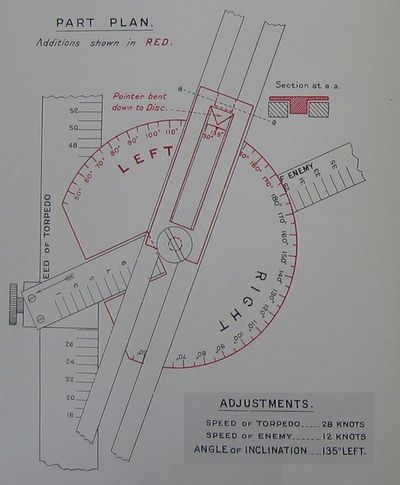Difference between revisions of "Torpedo Director Pattern 2390"
| Line 6: | Line 6: | ||
It was not circular, and probably a 60 degree arc like the 1895.<ref>''Handbook of Torpedo Control, 1916'', p. 16.</ref>{{INF}} It lacked graduations on its sighting arm, but by 1916 at least, they sported [[Robinson Disc|inclination discs]]. | It was not circular, and probably a 60 degree arc like the 1895.<ref>''Handbook of Torpedo Control, 1916'', p. 16.</ref>{{INF}} It lacked graduations on its sighting arm, but by 1916 at least, they sported [[Robinson Disc|inclination discs]]. | ||
| − | The Pattern 2390a had more rigid pivots, sturdier construction, and a sighting arm that was solid rather than slotted, and made of hard rolled brass.<ref>''Handbook of Torpedo Control, 1916'', p. 16.</ref> | + | The Pattern 2390a had more rigid pivots, sturdier construction, and a sighting arm that was solid rather than slotted, and made of hard rolled brass.<ref>''Handbook of Torpedo Control, 1916'', p. 16.</ref> They were often 2390s that had been repaired to the new standard and also featured a pinion for enemy speed adjustment with diagonal rather than rectangular teeth, making a smoother adjustment.<ref>''Addenda (1911) to Torpedo Manual, Vol. III., 1909'', pp. 170-171.</ref> |
==See Also== | ==See Also== | ||
Revision as of 19:17, 13 April 2011

Note the lack of any graduations on the sighting arm.
The Torpedo Director Pattern 2390 was a British Torpedo Director available by 1912 at least, and supplied to torpedo craft with heater torpedoes.
It was similar to the Pattern 1895, but graduated for higher torpedo and enemy speeds.[2][3][4] It would be mounted directly on the tube, and was a suitable substitute for an 1895 or 1193.[5]
It was not circular, and probably a 60 degree arc like the 1895.[6][Inference] It lacked graduations on its sighting arm, but by 1916 at least, they sported inclination discs.
The Pattern 2390a had more rigid pivots, sturdier construction, and a sighting arm that was solid rather than slotted, and made of hard rolled brass.[7] They were often 2390s that had been repaired to the new standard and also featured a pinion for enemy speed adjustment with diagonal rather than rectangular teeth, making a smoother adjustment.[8]
See Also
Footnotes
- ↑ The Annual Report of the Torpedo School, 1914, Plate 11.
- ↑ Torpedo Drill Book, 1912, p. 494.
- ↑ Torpedo Drill Book, 1914, p. 564.
- ↑ Handbook of Torpedo Control, 1916, p. 16.
- ↑ Addenda (1911) to Torpedo Manual, Vol. III., 1909, p. 170.
- ↑ Handbook of Torpedo Control, 1916, p. 16.
- ↑ Handbook of Torpedo Control, 1916, p. 16.
- ↑ Addenda (1911) to Torpedo Manual, Vol. III., 1909, pp. 170-171.
Bibliography